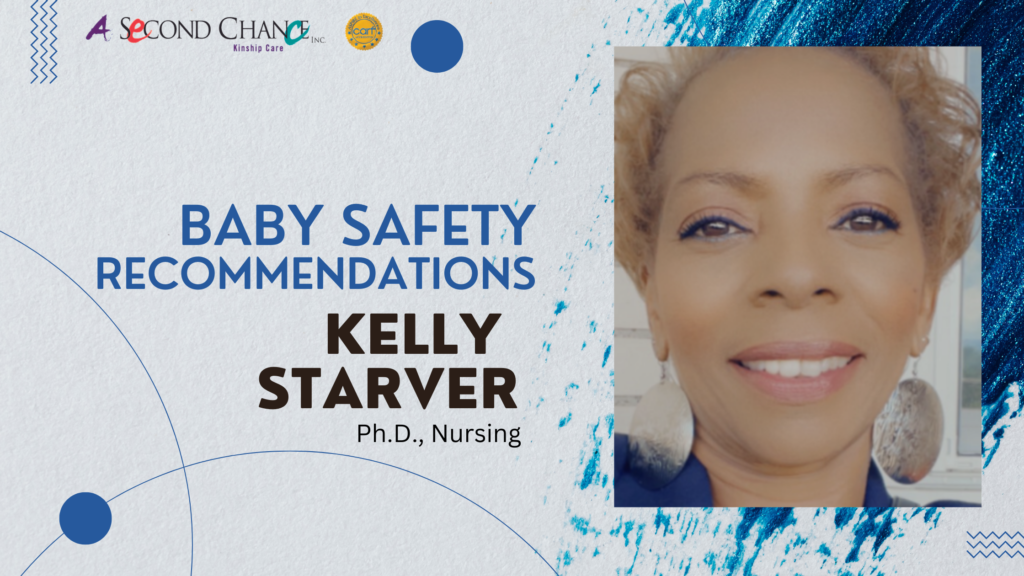Blog
National Baby Safety Month: Recommendations for Kinship Caregivers on Baby Safety Kelly Starver, Ph.D. Nursing

The month of September recognizes baby safety and kinship care as national designations. For many kinship caregivers, having a baby in the house or caring for a baby may be a completely new experience.
According to the Assistant Secretary for Planning and Evaluation, forty-four states saw increases in infants entering foster care. These increases ranged from 2 percent to 124 percent. Additionally, over the past 40 years, the share of U.S. children living in a grandparent’s household has climbed steadily, more than doubling from 3 percent in 1970 to 7 percent in 2010.
ASCI has partnered with Dr. Kelly Starver, who has a Ph.D. in Nursing, to provide baby and toddler age safety recommendations to assist with providing a safe, secure, and nurturing environment to children in the care of relatives or close family friends.
Scenarios

Starver responds, “previously, you would put the baby on your stomach for nap time or sleeping through the night, now it’s changed to laying the baby on their back to sleep.”
Here are some additional points for general safety that Starver mentions:
- House Safety – Baby and toddler proofing your home helps ensure a safe place for children to play and explore while preventing injuries. Proofing measures include (but are not limited to): keeping firearms locked away and out of reach; outlet covers over all outlets within their reach; and anchors to prevent furniture from tipping over and potentially falling on the child.
- Car Safety – Both infants and toddlers should ride in a rear-facing car seat for as long as possible. When they reach the highest weight or height allowed by their car safety seat’s manufacturer, the car seat can be turned forward.
- Hygiene Safety – Hygiene is critically important for infants and toddlers as they are very vulnerable to germs and viruses. Some helpful tips include to always keep their hands clean, clean their toys often, and keep up on diaper changes.
Check out cdc.gov for more recommendations for infants and toddlers (ages 0-3).

Starver shares that, it’s important to read about Sudden Infant Death Syndrome and why it occurs. She also recommends checking out The Safe to Sleep Campaign – formally known as the Back to Sleep Program – which was developed to support parents and caregivers.
As Starver noted “if you grew up in my era, our parents did everything wrong according to the standards today. We’re all safe and alive, but the rules changed.”
One key element that changed how babies sleep. We now know that if “a baby is laying on its stomach they can’t turn their heads if their nostrils are in the mattress or pillow, which is why today’s advice id for infants to sleep on their backs. There should also be no stuffed animals or pillows and sometimes even bumper pads are not approved.”
For additional information, check out healthybaby.org for safe sleeping recommendations.

Starver answers it is “vitally important for all children to have a schedule. We know that their brains are not fully developed and sleep promotes brain health. On a schedule, you’re able to feed them at the proper time and they go to the potty at the proper time. As grown-ups, we know how well a schedule works for us, when we have to get up and go to work, so we know we have to lay our clothes out the night before and take our showers. You certainly need to have a routine and I think that [changes] individually, with trial and error.”
For additional information, check out eclkc.ohs.acf.hhs.gov for schedule recommendations.

Starver’s response: “No. First, you need to connect with your pediatrician. Just because you think it’s a cold doesn’t guarantee that it is. Perhaps that’s even a visit to urgent care. We have to think about, is there a fever involved? A lot of times, cold symptoms are similar to teething symptoms. How do you know what’s going on, unless a physician diagnoses your child.”
Starver continues, “Medication safety is also important. Back in the day, there was Mr. Yuk, he still exists. Mr. Yuk and he still exists. Mr. Yuk stickers should be a part of the plan, not just for medications, but for household cleaning products. Label things that toddlers tend to be curious about and want to explore. Medications should be put up high out of reach where a child would not be able to get them. Know the medication schedule. People tend to think that more is better, more is not better. Keep a record of the medication. [For smaller] children, you don’t know you have an allergy until you have an [allergic reaction]. Kids are allergic to medications all the time so it’s important to have a pediatrician, other physician, or nurse practitioner involved so that you don’t make the wrong decision [using] over the counter medications.”
For additional information, check out safekids.org for schedule recommendations.